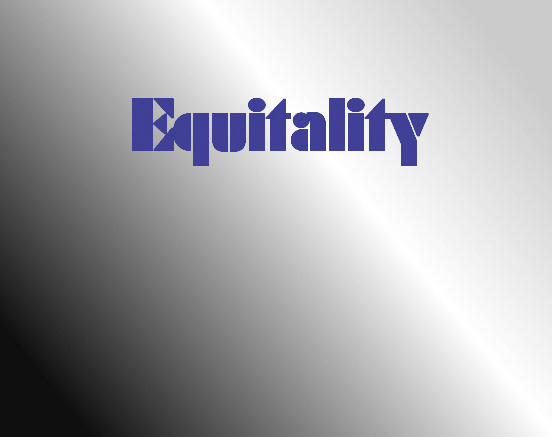
Equality, Not to be Conflated with Equity
Recently, I was invited to attend a virtual meeting that was to focus on Diversity, Equity and Inclusion (DEI). I have recently blogged on each of these, so I thought it a great opportunity to either receive confirmation of my understanding of each, or an opportunity for exposure to that which I have not yet had exposure to.
The D and the I portions of the discussion were relatively straightforward and mostly confirmed my understanding of each. And I agree that both D (true diversity) and I are important to the betterment of society on the whole. And I encourage you to read my other blogs on these concepts to get a complete understanding of my position. But when the definition of equity was presented, I was a bit confused. I immediately recognized a large majority of the definitions included as to what equity envelops were actually definitions of the word equality.
Equity and equality are two terms that should remain distinct and separate from one another. Equity relates to fairness and justice, while equality is about treating everyone equally. But as I discovered in the meeting, there’s been a morphing of the word equity to incorporate the definitions of the word equality. Traditionally, equity has been defined as “the quality of being just or impartial: fairness” and has largely been used as a legal term. However, in recent years there has been a morphing of the word to incorporate the definition of “equality” – the state of being equal. This shift has led to confusion and negative impacts on many levels.
Firstly, the substitution of “equity” for “equality” can be confusing for folks who are not familiar with this conflation. When individuals talk about “equity”, many understand that the conversation centers on giving everyone the same outcome in life regardless of their efforts or abilities. However, this idea of equity is one that is antithetical with the traditional American value of meritocracy, where hard work is rewarded and successes earned. Many would champion that doing things differently than a traditional American approach is a good thing. That the breaking down of traditional American values is necessary because they are based in racism or white – supremacy. But meritocracy is not a white American construct. A great number of cultures of the world now place merit as a main consideration for advancement. Of course, you will find a great many examples where bloodline is deemed most important, but not to the extent it has been historically.
Moreover, the over reliance on the concept of “equity” can detract from the ultimate goal of “equality”, which is paramount according to teachings by the great Dr. Martin Luther King Jr. Equality is about ensuring every individual has the same opportunities and the same starting line, in stark contrast to equity which suggests everyone should finish at the same point. While equity may seem like a desirable trait, it is the individual meritocracy that keeps society functioning, providing the motivation to individuals to work harder and smarter to achieve their goals.
Additionally, the morphing of the word “equity” can have negative consequences on the application of justice in a legal system. Justice should be fair and impartial. It should be applied according to the letter of the law, regardless of the background or social status of the individual. When equity, in its morphed state, is viewed as a form of justice, it risks losing some of its impartialness, thus the balance in the justice system may become skewed towards particular groups or communities. This would ultimately be detrimental to society as a whole, leading to a divided society with differing rights based on race, class, or gender.
Most importantly, the true definition of “equity” threatens to undermine the traditional meaning of “equality”. If we begin to prioritize equity over equality, the society will become stagnant, as people may no longer have the motivation to work hard for their personal or collective gain. It is the American dream, after all, the spurs individuals to strive for success with the expectation that their efforts and abilities will be rewarded.
Words are very important and when words that have traditionally been very different are conflated, there is not simple confusion in the discussion, but suspicion creeps into and can end up dominating the process. I agree that both equality and equity, as traditionally defined, are very important for a functional society. But this new definition of equity is very subjective and dependent on an individual’s perspective. Equality was the path established during the Equal Rights Movement. Heck, equal is the root word of equality. I realize that some words definitions morph/alter through the years, absorbing other meanings, but equality is a very important word that should not be lost in a transitional society in an attempt to make an ideology more palatable. Some ideas are far too important and must be preserved.